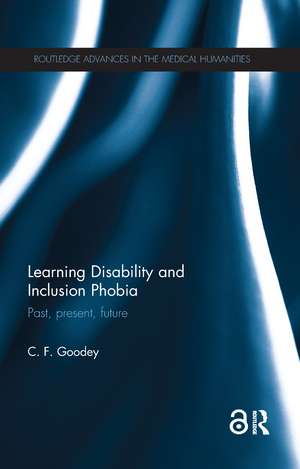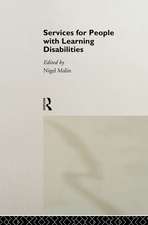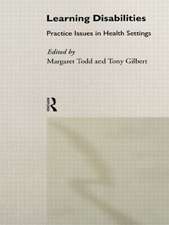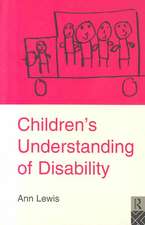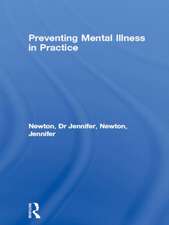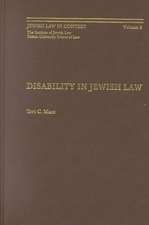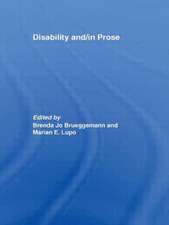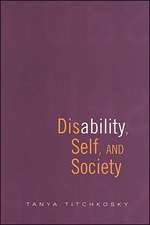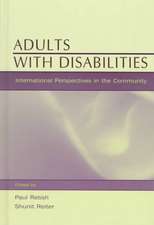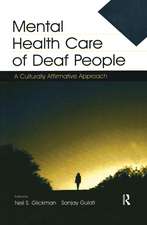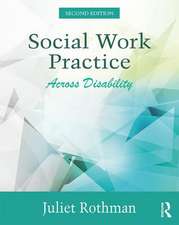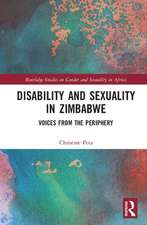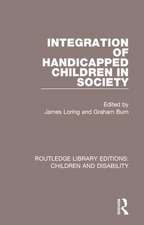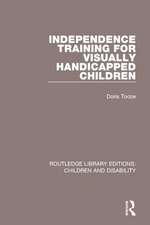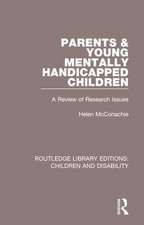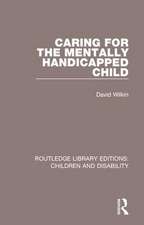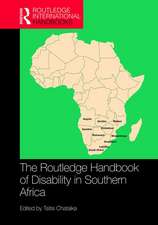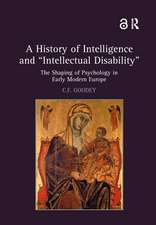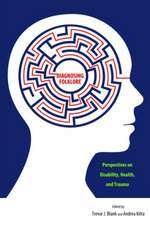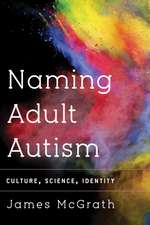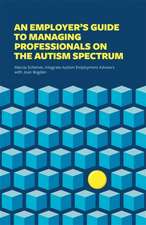Learning Disability and Inclusion Phobia: Past, Present, Future: Routledge Advances in the Medical Humanities
Autor C. F. Goodeyen Limba Engleză Paperback – 21 dec 2017
This innovative volume explains how concepts of learning disability, intellectual disability and autism first came about, describes their more recent evolution in the formal disciplines of psychology, and shows the direct relevance of this historical knowledge to present and future policy, practice and research. Goodey argues that learning disability is not a historically stable category and different people are considered "learning disabled" as it changes over time. Using psychological and anthropological theory, he identifies the deeper lying pathology as "inclusion phobia", in which the tendency of human societies to establish an in-group and to assign out-groups reaches an extreme point. Thus the disability we call "intellectual" is a concept essential only to an era in which to be human is essentially to be deemed intelligent, autonomous and capable of rational choice.
Interweaving the author's historical scholarship with his practice-based experience in the field, Learning Disability and Inclusion Phobia challenges myths about the past as well as about present-day concepts, exposing both the historical continuities and the radical discontinuities in thinking about learning disability.
| Toate formatele și edițiile | Preț | Express |
|---|---|---|
| Paperback (1) | 489.00 lei 6-8 săpt. | |
| Taylor & Francis – 21 dec 2017 | 489.00 lei 6-8 săpt. | |
| Hardback (1) | 1108.37 lei 6-8 săpt. | |
| Taylor & Francis – 15 oct 2015 | 1108.37 lei 6-8 săpt. |
Din seria Routledge Advances in the Medical Humanities
- 5%
 Preț: 316.79 lei
Preț: 316.79 lei -
 Preț: 325.89 lei
Preț: 325.89 lei -
 Preț: 310.22 lei
Preț: 310.22 lei -
 Preț: 311.41 lei
Preț: 311.41 lei - 5%
 Preț: 834.04 lei
Preț: 834.04 lei -
 Preț: 311.41 lei
Preț: 311.41 lei - 5%
 Preț: 288.16 lei
Preț: 288.16 lei - 5%
 Preț: 348.73 lei
Preț: 348.73 lei - 5%
 Preț: 379.80 lei
Preț: 379.80 lei - 5%
 Preț: 362.63 lei
Preț: 362.63 lei - 5%
 Preț: 1158.84 lei
Preț: 1158.84 lei - 5%
 Preț: 382.17 lei
Preț: 382.17 lei - 26%
 Preț: 766.05 lei
Preț: 766.05 lei -
 Preț: 371.91 lei
Preț: 371.91 lei - 5%
 Preț: 1161.55 lei
Preț: 1161.55 lei - 5%
 Preț: 350.21 lei
Preț: 350.21 lei - 5%
 Preț: 457.16 lei
Preț: 457.16 lei -
 Preț: 396.14 lei
Preț: 396.14 lei - 5%
 Preț: 354.21 lei
Preț: 354.21 lei - 5%
 Preț: 349.08 lei
Preț: 349.08 lei -
 Preț: 371.31 lei
Preț: 371.31 lei - 5%
 Preț: 1094.14 lei
Preț: 1094.14 lei -
 Preț: 303.53 lei
Preț: 303.53 lei - 18%
 Preț: 842.38 lei
Preț: 842.38 lei - 25%
 Preț: 710.66 lei
Preț: 710.66 lei - 31%
 Preț: 764.20 lei
Preț: 764.20 lei - 5%
 Preț: 349.28 lei
Preț: 349.28 lei -
 Preț: 384.59 lei
Preț: 384.59 lei -
 Preț: 368.63 lei
Preț: 368.63 lei - 18%
 Preț: 998.56 lei
Preț: 998.56 lei
Preț: 489.00 lei
Nou
Puncte Express: 734
Preț estimativ în valută:
93.60€ • 101.70$ • 78.67£
93.60€ • 101.70$ • 78.67£
Carte tipărită la comandă
Livrare economică 21 aprilie-05 mai
Preluare comenzi: 021 569.72.76
Specificații
ISBN-13: 9780815355212
ISBN-10: 0815355211
Pagini: 196
Dimensiuni: 156 x 234 x 11 mm
Greutate: 0.45 kg
Ediția:1
Editura: Taylor & Francis
Colecția Routledge
Seria Routledge Advances in the Medical Humanities
Locul publicării:Oxford, United Kingdom
ISBN-10: 0815355211
Pagini: 196
Dimensiuni: 156 x 234 x 11 mm
Greutate: 0.45 kg
Ediția:1
Editura: Taylor & Francis
Colecția Routledge
Seria Routledge Advances in the Medical Humanities
Locul publicării:Oxford, United Kingdom
Public țintă
Postgraduate and UndergraduateCuprins
1. Introduction 2. Exclusion 3. Intelligence 4. Difference 5. Causes 6. Development 7. Assessment 8. The Autism Paradigm 9. Autism in Context 10. Conclusion
Notă biografică
C. F. Goodey is Honorary Fellow at the Centre for Medical Humanities, University of Leicester, having previously held teaching and research posts elsewhere in the UK at Ruskin College, the Open University and University College London Institute of Education. He is also an independent consultant on learning disability services for local government and national organizations. He is the author of A History of Intelligence and 'Intellectual Disability': The Shaping of Psychology in Early Modern Europe.
Recenzii
Layers of ancient historical, psychological, subconscious and many other deeply held assumptions, confusions and phobias are meticulously uncovered. This erudite study shows how successive prejudices against various disadvantaged groups have come to be targeted against people with learning disabilities, and how the problems lie primarily in the phobias.
Priscilla Alderson PhD, Professor Emerita of Childhood Studies,
UCL Institute of Education, London
Priscilla Alderson PhD, Professor Emerita of Childhood Studies,
UCL Institute of Education, London
Descriere
This innovative volume explains how concepts of learning disability, intellectual disability and autism first came about, describes their more recent evolution in the formal disciplines of psychology, and shows the direct relevance of this historical knowledge to present and future policy, practice and research.
